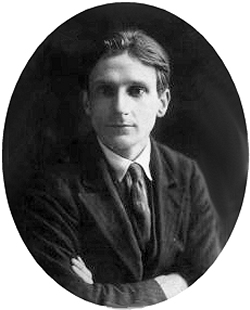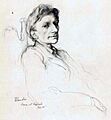Edmund Blunden facts for kids
Quick facts for kids
Edmund Blunden
|
|
|---|---|

Blunden, c. 1914
|
|
| Born | Edmund Charles Blunden 1 November 1896 London, England |
| Died | 20 January 1974 (aged 77) Long Melford, England |
| Resting place | Holy Trinity Church, Long Melford |
| Occupation | Poet, author |
| Education | Christ's Hospital; Queen's College, Oxford |
| Notable works | Poems 1913 and 1914; An Elegy and Other Poems; Cricket Country; Poems on Japan |
| Notable awards | Military Cross; C.B.E.; the Queen's Gold Medal for Poetry |
| Spouse | Mary Daines Sylva Norman Claire Margaret Poynting |
| Partner | Aki Hayashi |
| Children | seven |
Edmund Charles Blunden (born November 1, 1896 – died January 20, 1974) was an English poet and writer. He also worked as a literary critic. Like his friend Siegfried Sassoon, he wrote about his experiences in World War I in both poems and stories.
For much of his life, Blunden reviewed books for English magazines. He also taught at universities in Tokyo and Hong Kong. Later, he became the Professor of Poetry at the University of Oxford. He was nominated for the Nobel Prize in Literature six times.
Contents
Early Life and School
Edmund Blunden was born in London. He was the oldest of nine children. His parents, Charles and Georgina Blunden, were both headteachers at a school in Yalding.
Edmund went to Christ's Hospital, a famous boarding school. Later, he studied at The Queen's College, Oxford.
Serving in World War I
In September 1915, during World War I, Blunden joined the British Army. He became a second lieutenant in the Royal Sussex Regiment. He served on the Western Front in France.
He fought in major battles like Ypres and the Somme. In 1917, he also took part in the Battle of Passchendaele. For his bravery in action, he received the Military Cross (MC) in January 1917.
Blunden spent almost two years on the front lines. He was lucky not to be physically hurt, even though he was gassed in 1917. However, the war left him with lasting mental scars. He later wrote about his wartime experiences in his book, Undertones of War, published in 1928.
Life at University and as a Writer
After the war, Blunden left the army in 1919. He went to Oxford University, where he had a scholarship. He studied English literature alongside his friend, Robert Graves.
However, Blunden found university life wasn't for him. He left in 1920 to start a career as a writer. He first worked as an assistant for the Athenaeum magazine.
A famous poet, Siegfried Sassoon, became a close friend and supporter of Blunden. In 1920, Blunden published a collection of poems called The Waggoner. He also helped edit the poems of John Clare.
His next book of poems, The Shepherd, came out in 1922. It won the Hawthornden Prize. Even though his poetry was well-liked, it didn't earn him enough money to live on.
In 1924, he accepted a job as a Professor of English at the University of Tokyo in Japan. He returned to England in 1927 and worked as a literary editor for a year.
In 1931, Blunden went back to Oxford. He became a Fellow at Merton College and was a respected tutor. During his time at Oxford, he wrote many books. These included poetry collections like Choice or Chance (1934) and Shells by a Stream (1944). He also wrote about other writers such as Charles Lamb and Percy Bysshe Shelley.
He also wrote a book about his favorite sport, Cricket Country (1944). In 1944, he became an assistant editor for The Times Literary Supplement. In 1947, he returned to Japan. Later, in 1953, he became a Professor of English Literature at the University of Hong Kong.
Later Years
Blunden retired in 1964 and moved to Suffolk, England. In 1966, he was chosen to be the Oxford Professor of Poetry. He won by a large number of votes. However, he found giving public lectures too tiring. He resigned from the role after only two years.
Edmund Blunden passed away from a heart attack at his home in Long Melford, Suffolk, in 1974. He is buried in the churchyard of Holy Trinity Church, Long Melford.
Personal Life and Interests
Edmund Blunden was married three times and had children.
He had a great love for cricket, which he wrote about in his book Cricket Country. He played cricket often, even though he wasn't very good at it! His friend, the writer George Orwell, described him as a "true cricketer." Orwell said Blunden loved informal village games, where players might be called away for work.
A writer from Bangalore, Suresh Menon, wrote about Blunden's book. He said that Blunden believed cricket wasn't just a game. It was connected to the countryside, gardens, and barns around the cricket field.
Blunden also had a good sense of humor. His fellow poets thought highly of him. They held a special dinner in his honor, where poets like Cecil Day-Lewis and William Plomer wrote poems for him. Famous poets like T. S. Eliot were also guests.
Awards and Recognition
Edmund Blunden received several honors:
- The CBE in 1951.
- The Queen's Gold Medal for Poetry in 1956.
- The Benson Medal from the Royal Society of Literature.
- The Order of the Rising Sun, 3rd Class, from Japan in 1963.
- Honorary membership of the Japan Academy.
On November 11, 1985, Blunden was honored at Poets' Corner in Westminster Abbey. A special stone was placed there to remember him and 15 other poets from World War I. The words on the stone were written by another war poet, Wilfred Owen: "My subject is War, and the pity of War. The Poetry is in the pity."
Works
Edmund Blunden wrote many books and poems. He once said that time was the best editor for a poet's work.
Poetry
- Poems 1913 and 1914 (1914)
- The Barn (1916)
- Pastorals (1916)
- The Waggoner and Other Poems (1920)
- The Shepherd, and Other Poems of Peace and War (1922)
- Masks of Time: A New Collection of Poems Principally Meditative (1925)
- Japanese Garland (1928)
- Near and Far: New Poems (1929)
- Halfway House: A Miscellany of New Poems (1932)
- Choice or Chance: New Poems (1934)
- An Elegy and Other Poems (1937)
- Poems, 1930–1940 (1940)
- Shells by a Stream (1944)
- After the Bombing, and Other Short Poems (1949)
- Poems of Many Years (1957)
- A Hong Kong House (1959)
- Poems on Japan (1967)
Biographical Books (about other people's lives)
- Leigh Hunt. A Biography (1930)
- Charles Lamb and his Contemporaries (1933)
- Thomas Hardy (1941)
- Shelley. A Life Story (1946)
You can also hear Blunden reading his own poem, Concert Party, Busseboom, on an audiobook CD called Artists Rifles (2004).
Images for kids
See also
 In Spanish: Edmund Blunden para niños
In Spanish: Edmund Blunden para niños
 | Laphonza Butler |
 | Daisy Bates |
 | Elizabeth Piper Ensley |





